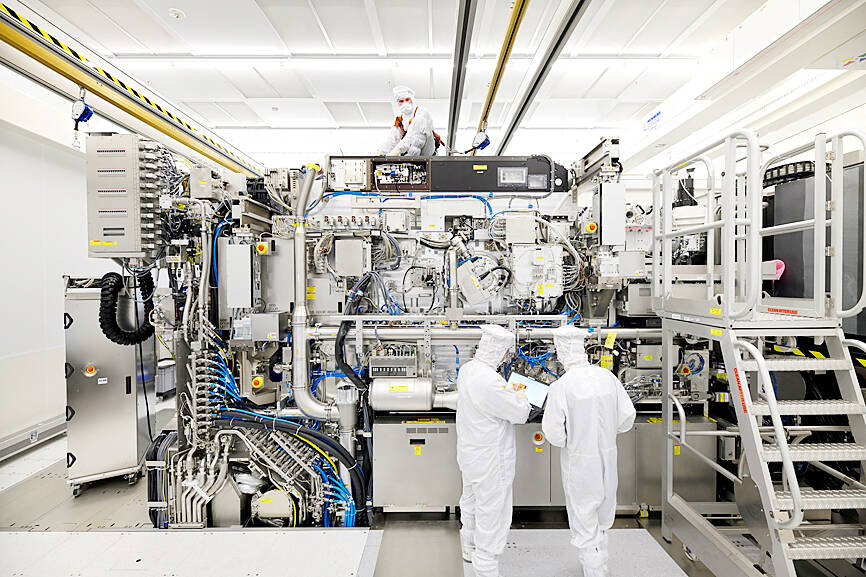The Dutch government on Wednesday announced that it is planning to impose additional restrictions on the export of machines that make advanced processor chips, joining a US push that aims at limiting China’s access to materials used to make such chips.
Dutch Minister for Foreign Trade and Development Cooperation Liesje Schreinemacher sent a letter to lawmakers outlining the proposed limitations, which come in addition to existing export controls on semiconductor technology.
“In view of technological developments and geopolitical context, the government has come to the conclusion that it is necessary for [inter]national security to extend the existing export control of specific semiconductor production equipment,” she wrote.

Photo: REUTERS / ASML / Bart van Overbeeke Fotografie
Dutch Prime Minister Mark Rutte visited US President Joe Biden in January for talks on advanced chip machines made by Dutch company ASML Holding NV and other topics.
ASML, headquartered in the southern Dutch town of Veldhoven, is the world’s only producer of machines that use extreme ultraviolet lithography to make advanced semiconductor chips.
The Dutch government has prohibited ASML from exporting some of its machines to China since 2019, but the company had still been shipping lower-quality lithography systems there.
ASML has research and manufacturing centers in Beijing and Shenzhen, China, as well as a regional headquarters in Hong Kong.
The Dutch minister’s letter to lawmakers did not mention China.
It said the new export control measures target “very specific technologies in the semiconductor production cycle on which the Netherlands has a unique and leading position, such as the most advanced deep ultraviolet [DUV] immersion lithography and deposition.”
It added that the decision for additional export controls “was made carefully and as precisely as possible, in order to avoid unnecessary disruption of the value chains and to take into account the international level playing field.”
The government said it would publish the new regulations “before the summer.”
In a statement published on its Web site, ASML said that the new restrictions would apply to its “most advanced deposition and immersion lithography tools.”
“Due to these upcoming regulations, ASML will need to apply for export licenses for shipment of the most advanced immersion DUV systems,” the company said, adding that it “will take time for these controls to be translated into legislation and take effect.”
The company added that based on the announcement, “our expectation of the Dutch government’s licensing policy, and the current market situation, we do not expect these measures to have a material effect on our financial outlook that we have published for 2023 or for our longer-term scenarios.”

Intel Corp chief executive officer Lip-Bu Tan (陳立武) is expected to meet with Taiwanese suppliers next month in conjunction with the opening of the Computex Taipei trade show, supply chain sources said on Monday. The visit, the first for Tan to Taiwan since assuming his new post last month, would be aimed at enhancing Intel’s ties with suppliers in Taiwan as he attempts to help turn around the struggling US chipmaker, the sources said. Tan is to hold a banquet to celebrate Intel’s 40-year presence in Taiwan before Computex opens on May 20 and invite dozens of Taiwanese suppliers to exchange views

Application-specific integrated circuit designer Faraday Technology Corp (智原) yesterday said that although revenue this quarter would decline 30 percent from last quarter, it retained its full-year forecast of revenue growth of 100 percent. The company attributed the quarterly drop to a slowdown in customers’ production of chips using Faraday’s advanced packaging technology. The company is still confident about its revenue growth this year, given its strong “design-win” — or the projects it won to help customers design their chips, Faraday president Steve Wang (王國雍) told an online earnings conference. “The design-win this year is better than we expected. We believe we will win

Quanta Computer Inc (廣達) chairman Barry Lam (林百里) is expected to share his views about the artificial intelligence (AI) industry’s prospects during his speech at the company’s 37th anniversary ceremony, as AI servers have become a new growth engine for the equipment manufacturing service provider. Lam’s speech is much anticipated, as Quanta has risen as one of the world’s major AI server suppliers. The company reported a 30 percent year-on-year growth in consolidated revenue to NT$1.41 trillion (US$43.35 billion) last year, thanks to fast-growing demand for servers, especially those with AI capabilities. The company told investors in November last year that

Power supply and electronic components maker Delta Electronics Inc (台達電) yesterday said it plans to ship its new 1 megawatt charging systems for electric trucks and buses in the first half of next year at the earliest. The new charging piles, which deliver up to 1 megawatt of charging power, are designed for heavy-duty electric vehicles, and support a maximum current of 1,500 amperes and output of 1,250 volts, Delta said in a news release. “If everything goes smoothly, we could begin shipping those new charging systems as early as in the first half of next year,” a company official said. The new